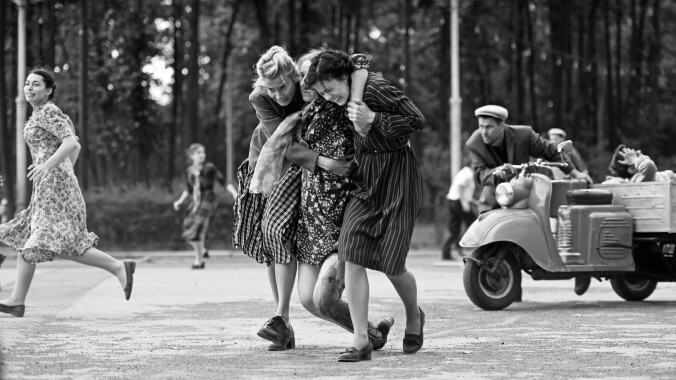Russia’s Oscar hopeful Dear Comrades! is spin disguised as a history lesson


Note: The writer of this review watched Dear Comrades! on a digital screener from home. Before making the decision to see it—or any other film—in a movie theater, please consider the health risks involved. Here’s an interview on the matter with scientific experts.
That Russian director Andrei Konchalovsky’s film Dear Comrades!, about the hushed-up 1962 massacre in Novocherkassk, is meant to provoke is clear from the first moments: The serious-looking opening credits are accompanied by the Soviet (and now Russian) national anthem, to which Konchalovsky’s father, Sergey Mikhalkov, wrote the words. Without some context, this might seem like a note of irony; to anyone familiar with the politics involved, it should elicit a groan.
Konchalovsky, after all, has had a bizarre, charmed career, the highlights of which include writing the screenplays for two Andrei Tarkovsky films, Andrei Rublev and Ivan’s Childhood, and directing the Sylvester Stallone and Kurt Russell team-up Tango & Cash. Though less of a wingnut than his brother, the actor, director, and film-industry monocrat Nikita Mikhalkov, he has long been a soft-power Putinist, enjoying all of the privileges of state approval, from financing (Dear Comrades! was produced by the billionaire Alisher Usmanov) to the ever-accumulating medals and honorary titles that have been a tradition of officialdom since Soviet times.
Of course, arch-conservative leanings are hardly unusual for Russian cultural figures who get exported abroad, though they are rarely recognized as such in different social climes further West. The problem is that Konchalovsky, who peaked as a director around Runaway Train in 1985, no longer displays the talent to back them up. This is how he articulates the ambitions of Dear Comrades!: It’s in black and white and Academy ratio. If it looks like an award-winning art film, then, by golly, it must be one.
In fact, the first act of the film—also its strongest stretch—is basically a comedy. The protagonist, Lyuda (Yuliya Vysotskaya), is a fortysomething functionary in Novocherkassk, a small city with a major electric locomotive industry. Outside of stultifying Communist Party committee meetings, she is carrying on an affair with a married KGB investigator, Loginov (Vladislav Komarov). The USSR is still in the midst of the reformist Khrushchev Thaw, but the local mood is low; food prices are rising and there are shortages of kefir and milk.
Lyuda herself is buying pantry staples from a black market grocer, which allows Konchalovsky to poke fun of mundane Soviet hypocrisies—an easy but reliable target. Nonetheless, she remains outwardly a true believer in communism and the officially disavowed Joseph Stalin, much to annoyance of her teenage daughter Svetka (Yulia Burova) and her aging dad (Sergei Erlish), a cranky Don Cossack who is still proud of having fought for the short-lived, anti-Bolshevik Don Republic, which claimed Novocherkassk as its capital during the Russian Civil War.
When word comes of a strike at the local locomotive factory, panic immediately sets in among the local administrators, Lyuda included. The higher authorities have already been notified and are on their way. Reports of a gathering crowd (“They have red banners and pictures of Lenin!”) lead to frantic attempts to control the revolt, rapidly devolving into farce. Government representatives in uniform deploy assorted profanities, a boundlessly rich Russian art form that unfortunately cannot be translated into the limited vocabulary and grammar of English swearing. As it becomes clear that Moscow is willing to resort to gunfire to disperse the protesters, the situation ceases to be funny.
Then comes the massacre, which Konchalovsky directs in ways that are both blunt and artless. According to the official investigation carried out after the collapse of the Soviet Union, 26 people were killed when soldiers opened fire on the crowd, their bodies quickly buried in secret; many more were arrested and sentenced to long prison terms. The event, which happened with full approval from the top, is one of the bloodier stains on the Nikita Khrushchev era’s reputation as an ostensibly liberal time in Soviet history.
In its bleak aftermath, Dear Comrades! becomes a different kind of film, one of those protracted searches for a missing person that demands to be read as a metaphor for cultural trauma. The metaphor, however, is perniciously nationalist in a way that has proven to be very effective. At the risk of trying to capital-E Explain Russia, one might summarize like this: It is the belief that history is an endurance test, of which Russians have been the undisputed champions.
There’s absolutely nothing wrong with this cultural pride; the evidence to back it up is considerable. The issue is how it gets explained. In Dear Comrades!, it comes down a purity of belief: Stalinism may have been filled with horrors and purges, but at least dyed-in-the-wool Stalinists believed in something. Konchalovsky shows us the emptiness behind the Khrushchev façade, turning Lyuda into a figure whose faith and perseverance are validated, even as everything else crumbles.
Critics are often accused of reviewing a filmmaker’s politics over the film. But the truth is that, outside of welcome stretches of humor (in the beginning) and tension (towards the end), there isn’t much more to Dear Comrades!. The script is filled with flat, rhetorical speeches that are done no favors by Konchalovsky’s static direction. Characters tender political positions, setting up a clumsy ideological conflict between the duplicitously cynical and the devoted, be they bearers of Lenin portraits or bearers of icons. This might sound like a nice sentiment, but not when it’s so clearly entangled in the ongoing revisionist project of the Putin perma-presidency, which has produced a fair number of officially supported, Oscar-submitted works that attempt to rehabilitate the Stalin era without trying to rehabilitate Stalin. Opposition to one authority is not the same thing as antiauthoritarianism, though the two have been mixed up many times—often with tragic consequences.